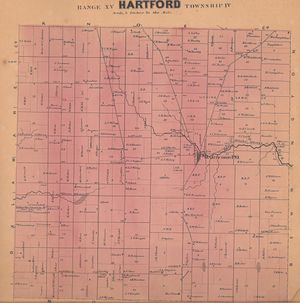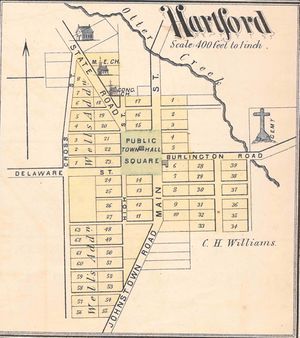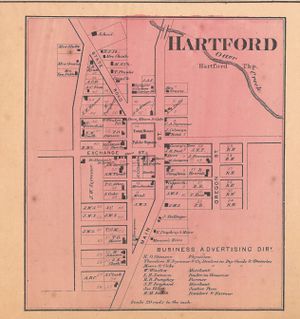Difference between revisions of "Hartford Township"
| (8 intermediate revisions by the same user not shown) | |||
| Line 1: | Line 1: | ||
| − | Hartford Township lies in the most northwesterly corner of Licking County. To its north lies Knox County, and to the east is [[Bennington Township]]. [[Monroe Township forms its boundary to the south and Delaware County to the west. The township lies at a more elevated position than much of the county and near the origins of the Otter Fork of the Licking River. The area possesses rich farmland over gently rolling terrain. <ref> Hill, N., History of Licking County, 464 </ref> There is little evidence in Hartford Township of the presence of Native Moundbuilders or their structures. The first European settler in the area was Daniel Poppleton in 1812, though several others preceded him in working the local land. At first, Hartford formed a part of Monroe Township, and then was joined under a larger Bennington Township in 1816 before finally earning its own township status in 1819. <ref> Hill, N., History of Licking County, 465 </ref> | + | [[File:Hartford township 1866 atlas.jpg|thumb|alt= Map of Hartford Township from 1866 Atlas of Licking County.|Map of Hartford Township from 1866 Atlas of Licking County.]]Hartford Township lies in the most northwesterly corner of Licking County. To its north lies Knox County, and to the east is [[Bennington Township]]. [[Monroe Township]] forms its boundary to the south and Delaware County to the west. The township lies at a more elevated position than much of the county and near the origins of the Otter Fork of the Licking River. The area possesses rich farmland over gently rolling terrain. <ref> Hill, N., ''History of Licking County'', (1881), 464 </ref> There is little evidence in Hartford Township of the presence of Native Moundbuilders or their structures. The first European settler in the area was Daniel Poppleton in 1812, though several others preceded him in working the local land. At first, Hartford formed a part of Monroe Township, and then was joined under a larger Bennington Township in 1816 before finally earning its own township status in 1819. <ref> Hill, N., ''History of Licking County'',(1881), 465 </ref> |
==Hartford== | ==Hartford== | ||
| − | The village that would eventually become known as [[Hartford]] village, but also Croton, was first platted in 1824 by Ezekial Wells and Elijah Durfey. <ref> Brister, E., Centennial History, 249 </ref> Hartford was the original name of the settlement, but this changed in 1866 when the post office was called Croton in order to avoid confusion with another Hartford in Ohio. | + | [[File:Hartford 1875 atlas.jpg|thumb|alt= Detail of Hartford village from 1875 Atlas of Licking County.|Detail of Hartford village from 1875 Atlas of Licking County.]] |
| + | [[File:Hartford1866 atlas.jpg|thumb|left|alt= Detail of Hartford Village from 1866 Atlas of Licking County.|Detail of Hartford Village from 1866 Atlas of Licking County.]]The village that would eventually become known as [[Hartford]] village, but also Croton, was first platted in 1824 by Ezekial Wells and Elijah Durfey. <ref> Brister, E., ''Centennial History'', (1909), 249 </ref> Hartford was the original name of the settlement, but this changed in 1866 when the post office was called Croton in order to avoid confusion with another Hartford in Ohio. The nomenclature of the only village in Hartford Township has vacillated between "Croton" and "Hartford," or even "Hartford Village Croton." <ref>Carrelli, J., "Croton: Hartford Fair put village on the map," ''The Advocate'', Jun. 26, 1987, 7 </ref> The mailing addresses in 2021 followed "Hartford" as the village's name, but the road leading north to the village and several churches within it still bear the name "Croton." | ||
==Hartford Fair== | ==Hartford Fair== | ||
| − | First Organized by the Hartford Independent Agriculture Company in 1858, the Hartford Fair, or the Hartford independent Fair, has grown to become the largest agricultural festival in the county and replaced the Licking County Fair. <ref>Carrelli, J., "Croton: Hartford Fair put village on the map," The Advocate, Jun. 26, 1987, 7 </ref> Spread out over 183 acres, it's tagline is "The Biggest Little Fair in the World." The fair draws hundreds of thousands of visitors each year. <ref> https://www.hartfordfair.com/about </ref> | + | First Organized by the Hartford Independent Agriculture Company in 1858, the Hartford Fair, or the Hartford independent Fair, has grown to become the largest agricultural festival in the county and replaced the Licking County Fair. <ref>Carrelli, J., "Croton: Hartford Fair put village on the map," ''The Advocate'', Jun. 26, 1987, 7 </ref> Spread out over 183 acres, it's tagline is "The Biggest Little Fair in the World." The fair draws hundreds of thousands of visitors each year. <ref> https://www.hartfordfair.com/about </ref> |
==Halycon Academy== | ==Halycon Academy== | ||
| − | A short-lived education center, named Halycon Academy, opened in remote Hartford Township in 1850. A number of local residents joined together to invest in an academy devoted to the training of teachers. Its first instructor was Yale-educated George Mills, who later settled in Newark. He was followed by another New Englander, a man educated in New Hampshire and Vermont named Mark Sperry. Starting in 1855, Sperry ran the academy and taught more than eight hundred students over the course of five years. The quality of education at | + | A short-lived education center, named Halycon Academy, opened in remote Hartford Township in 1850. A number of local residents joined together to invest in an academy devoted to the training of teachers. Its first instructor was Yale-educated George Mills, who later settled in Newark. He was followed by another New Englander, a man educated in New Hampshire and Vermont named Mark Sperry. Starting in 1855, Sperry ran the academy and taught more than eight hundred students over the course of five years. The quality of education at Halycon under Sperry was considered very high. After Sperry left the school in 1861 to fight in the Civil War, it continued under the direction of a J. W. Seymour with less success, eventually becoming incorporated into the local school system. <ref> Hill, N. ''History of Licking County'', (1881), 468 </ref> |
Hartford Fair website https://www.hartfordfair.com/about | Hartford Fair website https://www.hartfordfair.com/about | ||
| Line 18: | Line 19: | ||
'''J.G.''' | '''J.G.''' | ||
| + | |||
| + | |||
| + | Return to [[Townships and Communities]] main page. | ||
==References== | ==References== | ||
Latest revision as of 10:48, 28 October 2021
Hartford Township lies in the most northwesterly corner of Licking County. To its north lies Knox County, and to the east is Bennington Township. Monroe Township forms its boundary to the south and Delaware County to the west. The township lies at a more elevated position than much of the county and near the origins of the Otter Fork of the Licking River. The area possesses rich farmland over gently rolling terrain. [1] There is little evidence in Hartford Township of the presence of Native Moundbuilders or their structures. The first European settler in the area was Daniel Poppleton in 1812, though several others preceded him in working the local land. At first, Hartford formed a part of Monroe Township, and then was joined under a larger Bennington Township in 1816 before finally earning its own township status in 1819. [2]Hartford
The village that would eventually become known as Hartford village, but also Croton, was first platted in 1824 by Ezekial Wells and Elijah Durfey. [3] Hartford was the original name of the settlement, but this changed in 1866 when the post office was called Croton in order to avoid confusion with another Hartford in Ohio. The nomenclature of the only village in Hartford Township has vacillated between "Croton" and "Hartford," or even "Hartford Village Croton." [4] The mailing addresses in 2021 followed "Hartford" as the village's name, but the road leading north to the village and several churches within it still bear the name "Croton."Hartford Fair
First Organized by the Hartford Independent Agriculture Company in 1858, the Hartford Fair, or the Hartford independent Fair, has grown to become the largest agricultural festival in the county and replaced the Licking County Fair. [5] Spread out over 183 acres, it's tagline is "The Biggest Little Fair in the World." The fair draws hundreds of thousands of visitors each year. [6]
Halycon Academy
A short-lived education center, named Halycon Academy, opened in remote Hartford Township in 1850. A number of local residents joined together to invest in an academy devoted to the training of teachers. Its first instructor was Yale-educated George Mills, who later settled in Newark. He was followed by another New Englander, a man educated in New Hampshire and Vermont named Mark Sperry. Starting in 1855, Sperry ran the academy and taught more than eight hundred students over the course of five years. The quality of education at Halycon under Sperry was considered very high. After Sperry left the school in 1861 to fight in the Civil War, it continued under the direction of a J. W. Seymour with less success, eventually becoming incorporated into the local school system. [7]
Hartford Fair website https://www.hartfordfair.com/about
Hartford Township website http://hartfordtownship.net/
J.G.
Return to Townships and Communities main page.
References
- ↑ Hill, N., History of Licking County, (1881), 464
- ↑ Hill, N., History of Licking County,(1881), 465
- ↑ Brister, E., Centennial History, (1909), 249
- ↑ Carrelli, J., "Croton: Hartford Fair put village on the map," The Advocate, Jun. 26, 1987, 7
- ↑ Carrelli, J., "Croton: Hartford Fair put village on the map," The Advocate, Jun. 26, 1987, 7
- ↑ https://www.hartfordfair.com/about
- ↑ Hill, N. History of Licking County, (1881), 468


